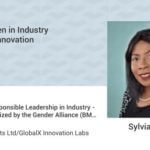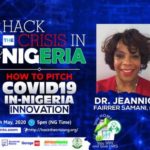Impact Stories from Professional Growth Policy Area

Fellow discusses ethical leadership at UN event
Fellow(s): Sylvia Mukasa
Country: Kenya
Cohort: 2014
Policy Area(s): Empowering Women and Girls, Professional Growth
This week, 2014 fellow Sylvia Mukasa shared her insights on advancing gender equality and ethical leadership in a roundtable on Women in Industry and Innovation sponsored by the United Nations Industrial Development Organization. Sylvia was joined by Louise Blaise, Permanent Mission of Canada to the United Nations, as well as CEO’s and women entrepreneurs from India, Mexico and San Francisco.
Sylvia, the CEO of GlobalX Investments and GlobalX Innovation Labs, spoke about how institutions can encourage responsible leadership within their organizational culture: “Leaders must manage resources, be visionary and ethical and focus on long-term goals without compromising values and principles,” she said. “This requires leaders to be agile, think in new ways, be innovative, ask the right questions and be comfortable not having all the answers.” She also included the challenges she’s faced leading as a woman in her industry. “We know the tech sector must do more towards equality, diversity and inclusion to overcome biases, barriers and stereotypes,” she said.
Report Date...: 7/13/20

Fellow co-authors article on Africa’s response to COVID-19
Fellow(s): Aretha Mare
Country: Zimbabwe
Cohort: 2013
Policy Area(s): Professional Growth
This week, 2013 fellow Aretha Mare co-authored an article published by Brookings, a non-profit public policy organization and research group. The article, “Learning from the best: Evaluating Africa’s COVID-19 responses,” outlines responses to the COVID-19 pandemic on the African continent, shares key insights and makes policy recommendations for the future.
Aretha is a research officer at Next Einstein Forum, responsible for policy research on state-of-the-art issues in science, technology and innovation in Africa. Recently, NEF has conducted research on responses to COVID-19 throughout the African continent, sharing key insights and recommendations. In the article, Aretha and her co-author highlight innovations from Senegal, where researchers created a COVID-19 immune-based diagnostic test for $1, as well as Ghana, where zipline drones have been used to deliver samples to testing sites. In Rwanda, similar drones are being used to deliver in-flight public broadcasts for greater health and safety awareness. The authors also include notable challenges, pointing to the need to increase data modeling capacity as well as create more effective infrastructure. They conclude with policy recommendations, including implementation of early response systems to emergencies. “Decisive leadership that stands on sound and contextual scientific, economic, and social advice, not political expediency, is key to accelerate containment and recovery,” they write.
Report Date...: 7/6/20

Mentor(s): Jill Finlayson (mentor)
Company: Women in Technology Initiative at UC Berkeley
Mentor Type: Professional
Policy Area(s): Education Diplomacy/Mentoring, Professional Growth
In an IIENetwork webinar, longtime TechWomen mentor Jill Finlayson shared her insights on design thinking, problem solving and innovation. The webinar,” Strategic Thinking for International Education,” featured Jill as well as Dr. Lisa Coleman, NYU’s inaugural senior vice president for global inclusion and strategic innovation.
Jill is the director the Women in Technology Initiative at UC Berkeley, leading their efforts to advocate for women in tech, facilitate mentorship and increase the visibility of women role models. In the webinar, she brought participants through the design thinking process and highlighted the ways in which design thinking facilitates problem-solving, redefines challenges and fosters innovative thinking. “People need to feel safe putting out crazy ideas,” Jill said, “And that’s where design thinking really shines.” She encouraged participants to adopt a “yes-and” mentality, telling them to always test their assumptions, iterate on feedback and work together to develop moonshot ideas.
Report Date...: 7/6/20

Fellow shares top 10 lessons on thriving at work
Fellow(s): Hanan Abu Fahra
Country: Palestinian Territories
Cohort: 2015
Policy Area(s): Professional Growth
2015 fellow Hanan Abu Fahra recently reflected on 10 years in the workforce, sharing 10 key takeaways with her network in a LinkedIn blog post. Hanan included lessons in mentorship, seeking out new opportunities and taking risks, as well as a list of motivational speeches from top global leaders.
Hanan’s sixth lesson – “When the fish is sick, you don’t treat the fish; you treat the water” – speaks about the need to be intentional when expanding your network: “Your circle of people is affecting you more than you think, that’s why you should be intentional in inviting in more ambitious people, people with visions bigger than you and bigger than themselves,” she writes. Hanan also shares advice on compassion, positivity and teamwork, reflecting on a lesson she learned from Jeff Weiner when he was CEO of LinkedIn, her host company during TechWomen. “It’s nice to be the smartest in the room, but it means nothing if you can’t play as one of the team,” she said.
Report Date...: 7/6/20

Fellow completes Open Africa Power Program
Fellow(s): Sharon Marerwa
Country: Zimbabwe
Cohort: 2019
Policy Area(s): Environmental Sustainability, Professional Growth
After her TechWomen mentorship at SunPower, 2019 fellow Sharon Marerwa was compelled to continue to expand her skillset, grow her network and work to address Africa’s energy challenges. This past February, she was among 60 young African energy leaders to participate in the Open Africa Power Program, a venture that partners with African universities to empower participants with technical, regulatory and business skills in the sustainable development sector. She graduated from the program this week, ready to use her skills to effect change on the African continent.
Sharon, a power planning and research engineer, built upon her TechWomen experience as an OAP fellow. “TechWomen taught me to be connected to the right people, identify as a global citizen and think globally,” she said. “It’s now my blood to learn and be in touch with new trends in the industry, innovate with purpose, design for restorative economics and make a better world.” During the six-month program, Sharon learned how to maximize energy impact in Africa through delivering and expanding affordable and sustainable energy services. With her new business skills, she hopes to contribute to unlocking Africa’s sustainable future. “Africa is facing energy challenges that require a new generation of young, skilled and talented leaders to take it upon themselves, lead from the front and electrify Africa,” she said.
Report Date...: 6/29/20

Fellow shares advice to young entrepreneurs in webinar
Fellow(s): Salma Gherraby
Country: Morocco
Cohort: 2019
Policy Area(s): Entrepreneurship, Professional Growth, Youth Engagement
This week, 2019 fellow Salma Gherraby delivered a webinar for young entrepreneurs in Morocco, sharing best practices on building a thriving business. The series, Moonshot@Home, is hosted by Ajtcd, a local NGO, with support from the U.S. Embassy Rabat.
Salma is the founder and CEO of Business Innovation, a tech consultancy and training firm. In her session, “10 Steps to Launch my Startup,” Salma presented on establishing a foundation for startups, developing an entrepreneurial mindset and understanding the entrepreneurial ecosystem within Morocco. She also shared her own journey in entrepreneurship and technology, demonstrating how she has built her own brand, developed a business model and learned how to effectively problem solve throughout her career. “45 people stayed and concentrated until the end, were interactive and even stayed after the session,” said Salma.
Report Date...: 6/29/20

Fellow featured as advocate for gender equality in STEM fields
Fellow(s): Sadaf Shaheen
Country: Pakistan
Cohort: 2018
Policy Area(s): Education Diplomacy/Mentoring, Empowering Women and Girls, Professional Growth, Youth Engagement
This week, 2018 fellow Sadaf Shaheen was interviewed in City Pulse magazine, an online periodical from Amnick, a UK-based social enterprise consulting firm. Sadaf is an international collaborator for their Smart Cities program.
In the feature, Sadaf reflects on the challenges she has faced as a woman in tech in Pakistan, sharing her work to dispel stronglyheld gender stereotypes within the country. “I knew it would be especially hard for me to enter the notoriously male-dominated field given the deeply entrenched gender norms in Pakistan, but I did it anyway,” she said. “Now, I am working as a role model in my native town for young girls.” Sadaf also spoke about her participation in the TechWomen program, as well as her upcoming professional goals. Soon, she hopes to launch a startup that trains women and girls in STEM fields, as well as expand her work as regional ambassador for Technovation.
Report Date...: 6/29/20

Fellow represents Algeria on global smart cities panel
Fellow(s): Ouafa Benterki
Country: Algeria
Cohort: 2012
Policy Area(s): Economic Impact, Entrepreneurship, Environmental Sustainability, Professional Growth
This month, 2012 fellow Ouafa Benterki joined other senior executives on a panel at the G-20Y Summit, a gathering of international tech leaders and entrepreneurs. The live session brought together experts to talk about the Smart City concept and how to make smart cities inclusive, safe and scalable.
Ouafa is the CEO and founder of MTY Intelligent Software, a technology startup that provides data analytics and localization services. It’s also the first Algerian startup to focus on artificial intelligence. During the session, Ouafa and the other panelists spoke about the key technologies that enable smart cities including AI, IoT, drones and more. They also discussed the challenges that arise when governments and municipalities deploying smart city innovations, sharing their insights on issues of privacy, ethics and trust.
Report Date...: 6/22/20

Fellow speaks about the importance of representation in tech
Fellow(s): Saba Rasheed Malik
Country: Pakistan
Cohort: 2017
Policy Area(s): Empowering Women and Girls, Professional Growth
This week, 2017 fellow Saba Rasheed Malik was featured by Wogrammer, an AnitaB.org platform that amplifies the work and impact of international women in STEM fields. Saba is an assistant professor of computer science at the National University of Computer and Emerging Sciences as well as the cofounder of weePro, a STEM education program that teaches young students about computational thinking, robotics, programming and more.
In the feature, Saba spoke about her passion for computer science as well as her efforts to increase the visibility of women technologists in Pakistan. She created her initiative, Pakistani Women in Computing (PWiC), in order to foster a network of women who can support one another and serve as role models for the next generation of women in STEM. With nine global chapters, Saba hopes that the network will inspire other women to push forward in their careers despite challenges. “Your mantra of life should be ‘learn and learn and learn!’” she said. “Never get tired of learning.”
Report Date...: 6/22/20

Fellow and mentor collaborate for COVID-19 hackathon
Fellow(s): Binta Moustapha, Dr. Jeannice Fairrer Samani (mentor)
Country: Nigeria, United States
Cohort: 2014
Policy Area(s): Economic Impact, Education Diplomacy/Mentoring, Empowering Women and Girls, Entrepreneurship, Professional Growth
Recently, 2014 fellow of Nigeria Binta Moustapha and TechWomen mentor Dr. Jeannice Fairrer Samani worked together for Hack the Crisis Nigeria, a three-day hackathon for COVID-19 innovation. The effort was a part of Hack the Crisis, a network of global hackathons that aims to harness the power of technology to solve leading crises. 100 Women in Tech Nigeria, Binta’s campaign that amplifies women leaders in Nigeria, organized the event.
Over the course of the hackathon, 50 teams addressed four challenge areas, applying their innovations to healthcare, communications and more. In addition to sourcing tech solutions to COVID-19 challenges, Binta prioritized creating awareness in indigenous languages such as Hausa, Yoruba and Igbo. Jeannice, the chair and founder of Fifth Wave STEaM Education initiative, delivered a virtual session on best practices in pitching. In her presentation Jeannice took the hackathon teams step-by-step through a successful pitching process, beginning with identifying a problem and pitching how their idea plans to solve it. “Introduce your company’s product or service as the ultimate solution to these problems,” she said. She also spoke about the importance of identifying a target market, finding an advantage over competitors and laying out a future roadmap. At the conclusion of the hackathon, three teams were given a cash award sponsored by NITDA, Nigeria’s National Information Technology Development Agency, as well as access to consulting services to further develop their ideas.
Report Date...: 6/22/20

